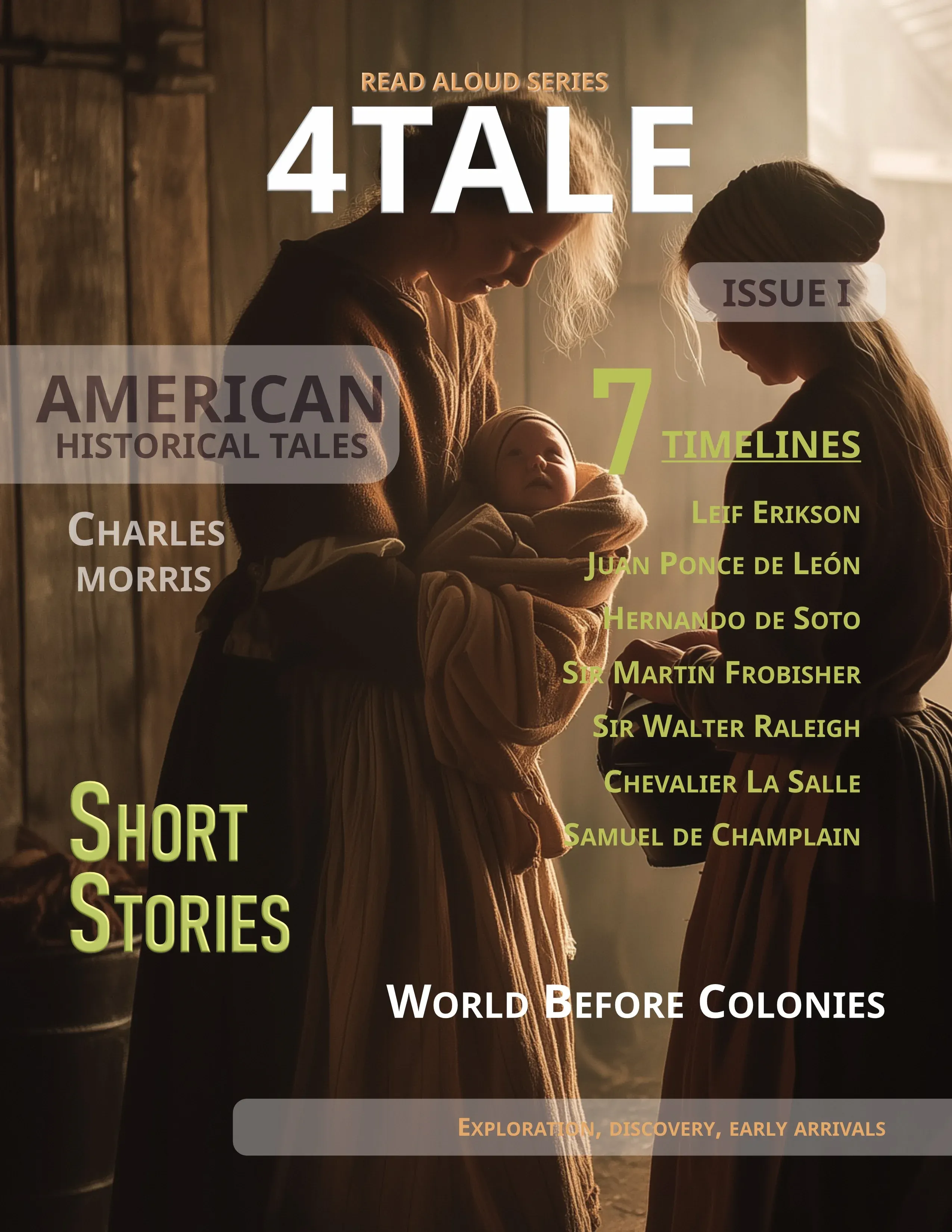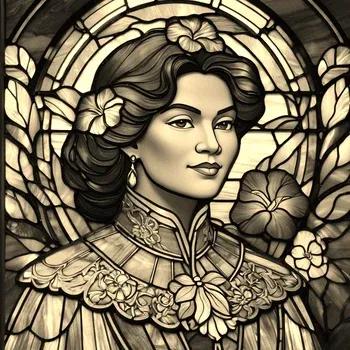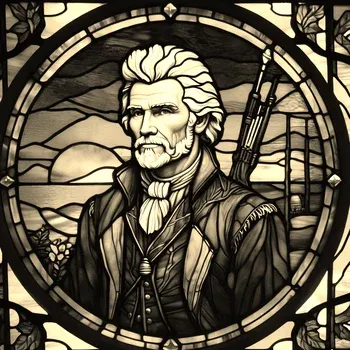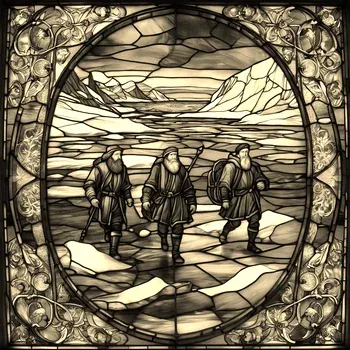BY CHARLES MORRIS
Vineland and the Vikings
Historical Tales 1 American: Story 1 of 27
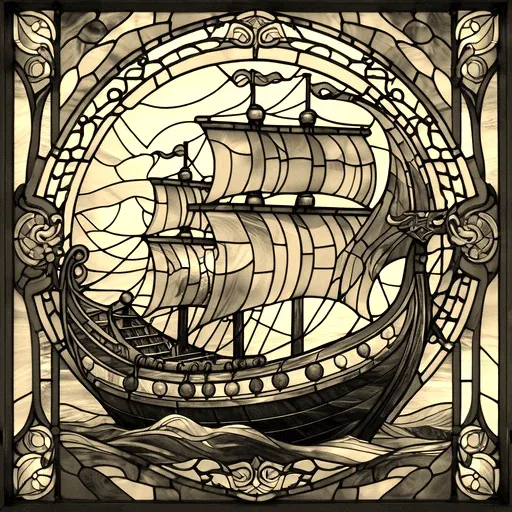
Heading
The Name "Vineland": Vineland, the most significant of the lands discovered by Leif Erikson, was named for the wild grapes found abundant there. This discovery not only indicated the fertility of the land but also the keen observational skills of the Vikings, who recognized the potential for cultivation and settlement in the New World.
First European Born in America: The birth of Snorri, son of Thorfinn and Gudrid, during their time in Vinland, marks the first recorded birth of a European in America, predating Columbus’s arrival by centuries and symbolizing the beginning of a European lineage in the New World.
A good book we like, we explorers. That is our best amusement, and our best time killer
- Roald Amundsen, Explorer
Leif Erikson and the Old Tales That Got Him Moving
The sagas didn’t come from libraries. They came from firelight and frost, passed mouth to mouth over fishbones and mead. Long nights, longer winters—stories were how folks stayed warm. And some of the best ones? They talk about Leif Erikson, son of Erik the Red, who didn’t exactly grow up dreaming about history, but sure ended up in it.
Around the year 1000—back when maps had more guesses than lines—Leif hears whispers. Stories about land west of Greenland. Flat rocks, forests, wild grapes. No one’s sure where it is or what’s really there, but that never stopped a Viking.
So he sails.
First, he hits a place they’d later call Helluland. Flat as a skipped stone and just about as welcoming. Probably Baffin Island. They don’t stay long.
Next: Markland. More trees, more promise. Probably Labrador. Still not quite it.
Then, finally, Vinland. And this place—this one—has grapes. Actual wild grapes. To a Norseman from the land of ice and boiled seal meat, that’s a revelation. They build a small outpost, test the soil, and try to get a foothold.
Did they settle for long? No. But they tried.
Thorfinn Karlsefni—wealthy, gutsy—brings over a whole crew. Livestock, people, plans. They meet the locals, the Skraelings. At first, it’s cautious. Then it’s tense. Then it’s spears and arrows. No surprise there—two worlds crashing into each other never ends tidy.
But before it all frays, something happens. A child is born—Snorri. First European kid born on American soil. That alone makes the whole saga feel a little less myth and a little more real.
Leif didn’t write any of this down. He just did it. And somewhere in the noise of discovery and retreat, you start to realize: the world was a lot more connected, a lot earlier, than we like to admit.
Greenland: The Ice Laced Launchpad
Greenland wasn't paradise. It was cold, brutal, and about as far from comfort as a Viking could get without falling off the map. But it was theirs. Erik the Red carved out a settlement there after getting kicked out of Iceland, which he only ended up in after getting kicked out of Norway. You could say trouble ran in the family.
Still, they made it work. Built farms where they could, tucked homes between the wind-shredded fjords. Not soft living, but survivable. And from that frozen rock, they looked west and wondered.
See, word had drifted back from sailors and storms—a land past the sea, not all ice and stone. Trees, they said. Grapes, maybe. It sounded half-myth, half-bait, but in Greenland, where winter chews your bones for sport, even a rumor of a better place was enough.
Greenland became a springboard. Not a destination, but a launchpad. Ships left from there chasing those rumors, eyes peeled for better shores. And when Leif set out, it wasn’t some grand mission. It was more like a hunch backed by guts.
No Greenland? Probably no Vinland. It was harsh, sure, but it gave them a place to start—a jagged edge to jump from. That bleak outpost helped open a door no one knew was there.
Bjarni Herjólfsson and the Lost Land
Before Leif ever set eyes on Vinland, Bjarni Herjólfsson got blown into history by accident. He wasn’t chasing legends or looking for grapes. He was just trying to find his dad in Greenland.
Thing is, the ocean had other plans. Storm hit, hard and long. No stars, no sun, just wind and gray for days. When it finally let up, Bjarni spots land—but not the icy cliffs he was expecting.
What he sees is strange. Low hills, thick woods, not a snowdrift in sight. But he doesn’t stop. No landing, no poking around. Maybe he was spooked. Maybe he just wanted to get to Greenland. Either way, he keeps sailing.
When he finally makes it to Greenland and tells the tale, people start listening. One of them is Leif.
You could call Bjarni the first European to lay eyes on North America. And yeah, he didn’t stick around. Didn’t even touch the shore. But sometimes, the spark comes from someone who wasn’t even trying to light a fire.
That accidental glimpse? It set everything in motion.
Podcast
Helluland: Hard Stones and Harder Choices
Leif’s first landfall wasn’t exactly the stuff of dreams. Helluland, they called it. Land of flat stones. Sounds about right. Probably Baffin Island—nothing green, nothing soft. Just slabs of rock stretching out like the land itself had given up trying to be pretty.
The crew didn’t hang around. You wouldn’t either. The place offered nothing: no wood to build with, no soil worth planting, no reason to stick around unless you were lost or stubborn.
But it mattered. It marked the first step into the unknown. A line crossed. Even if they didn’t find gold or glory there, they proved the sea didn’t go on forever. There was land.
Helluland wasn’t a destination. It was a marker. A cold handshake from a new continent. And sometimes, that’s enough to keep going.
Markland: Wood for the Taking
Next stop: Markland. And this place actually looked alive. Forests thick as secrets. Pines, birch—trees everywhere. For a Norseman used to scraping together driftwood back home, this was like stumbling onto gold you could chop down.
They didn’t settle here either, not really. But you can bet they loaded up what they could. Timber meant ships, shelters, heat. Markland might’ve been a pit stop, but it was a generous one.
No grapes, no grand adventure, just a stretch of land that said, "Here, take what you need." Sometimes, that’s enough.
It told them they were on the right trail. South of the stone, past the trees—maybe that’s where the good stuff was hiding.
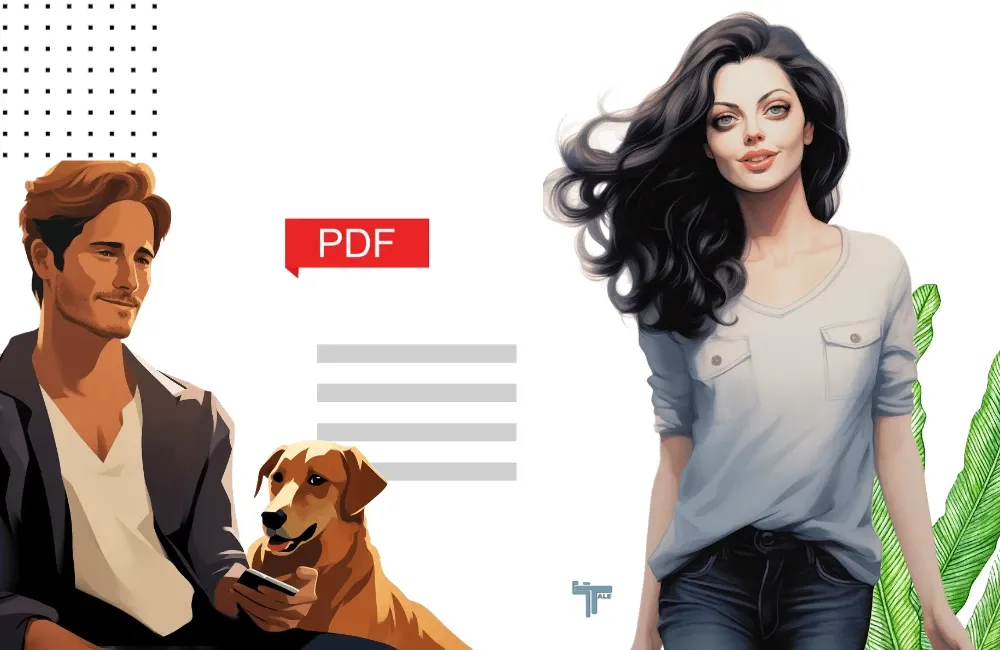
Vinland: The Grape-Sweet Mirage
Vinland. Now this was the place they’d been dreaming of. Grapes growing wild. Land that didn’t fight back the moment you stepped on it. Compared to Greenland or Helluland, it might as well have been Eden.
They built a camp—timber walls, longhouses, all the rough stuff they needed to get by. Didn’t waste time. The place looked like it might actually be worth the risk.
They hunted. Fished. Found berries and vines fat with fruit. And for a while, it probably felt like maybe—just maybe—this could work.
But then came the Skraelings. First, they traded. Then, they didn’t. Tension thickened. Something snapped. Arrows flew.
Still, they stuck it out longer than most people remember. Tried to farm, tried to live. And yeah, Thorfinn Karlsefni brought folks over like he meant to stay. Gudrid gave birth to Snorri—the first European born on this side of the ocean. That’s history, right there, breathing in a wood-framed cradle.
But the promise of Vinland came with a price. Skirmishes wore them down. The unknown pressed in. They’d come for peace or profit—doesn’t matter. They left with neither.
Vinland wasn’t a lie. It just wasn’t ready to be tamed. Not by them, not then.
Settling In: The Vinland Experiment
Once they hit Vinland, they didn’t just pitch tents. They meant to stay. Leif’s crew and later Karlsefni’s bunch got to work fast. Built longhouses with local timber, planted seeds, dug in.
The land was kind. Softer winters, wild game, fish in the rivers, vines in the woods. Compared to Greenland, it felt like a dream that hadn’t soured yet.
But building a life there? That’s another beast.
They weren’t just surviving. They were trying to build something lasting. They brought livestock. Tools. Everything you’d need to turn a patch of wilderness into a home. Even had a baby born there—Snorri. Little lungs crying out into a place where no other European had taken a first breath.
Still, they knew they were guests. Maybe even intruders. The Skraelings were already there, already rooted. And when strangers show up cutting trees and fencing off land, things go bad.
They had good days, sure. But the bad ones kept piling up. The fights, the fear, the sense that this land, as rich as it was, wasn’t going to let them settle easy.
They gave it a shot. Really tried. But even the toughest get tired.
Thorvald’s Luck Runs Out
After Leif, his brother Thorvald wanted his own shot at exploring. Maybe he thought he could do it better. Maybe he just wanted a piece of the map with his name on it.
He sailed with a small crew, nosed around the coast, probably went further south than anyone before him. Saw good timber, good beaches. He even started talking about staying for the long haul.
But dreams get cut short. On one quiet shore, they met Skraelings. Doesn’t matter who started it—words turned into spears, fast. Thorvald caught one in the ribs.
He didn’t make it.
They buried him there, in that foreign soil. Marked the grave with stones and grief.
Thorvald’s death hit hard. Not just because he was Leif’s brother, but because it proved what everyone feared—this wasn’t some unclaimed paradise. There were people here, and they weren’t just going to move over.
The dream of Vinland, already fragile, started to crack.
Thorfinn’s Big Swing
Thorfinn Karlsefni didn’t go halfway. When he made his move for Vinland, it was all-in—three ships, 160 folks, livestock, tools, everything but a city charter. He wasn’t exploring. He was colonizing.
He followed the same breadcrumbs: Helluland, Markland, then Vinland. Got there and got busy. Set up shop, started farming, built what looked a lot like permanence.
For a while, things held.
They traded with Skraelings. Raised animals. Harvested. Gudrid had Snorri there—first European kid born in the Americas. It looked like they might pull it off.
But peace is a fragile thing. One wrong move—no one knows exactly what it was—and things blew up. Spears flew, panic hit, and suddenly this peaceful experiment turned into a siege.
They stuck it out a few years. But blood and fear wear down even the bold. Thorfinn called it. Packed up, turned back, and left Vinland behind.
They didn’t fail because they were weak. They failed because the New World wasn’t empty—and it wasn’t theirs.
Making a Life: Hard Work, Hard Lessons
Living in Vinland wasn’t some campfire story. It was dirty boots and blistered hands. They planted crops—barley, maybe—and hoped the soil would listen. Hunted and fished like they’d done back home. Picked grapes, sure, but you can’t feed a village on wild fruit.
They tried trading too. The Skraelings had furs, maybe meat. The Norse had metal tools. Deals were made—sometimes. But that kind of balance doesn’t last long when fear starts creeping in.
At first, it might’ve felt like they were building something. Houses went up. Meals got cooked. A baby was born.
Then the cracks showed. Tensions flared. Nights got colder, watches got longer.
You can only trade so long before someone wants more. Or gets scared. Or angry. Then it’s not trade anymore. It’s defense. It’s survival.
Vinland could’ve worked. But surviving isn’t the same as living. And they knew it.
Skraelings—The People Already There
The sagas call them Skraelings. That’s all we’ve got, really. No names, no voices—just fragments from the Norse view. They were the ones who were already there, living their lives before the longships showed up.
The first meetings weren’t war. They traded. Furs, meat, tools. Curiosity went both ways.
But it didn’t last.
There were fights. People died. No one knew the rules, and both sides probably stepped over some line the other never saw.
The sagas tell it like the Norse were just defending themselves. But we know better than to take one side as gospel. The Skraelings weren’t ghosts. They had homes, histories, reasons to fight.
We don’t know their version. And that silence says more than the sagas ever could.
Vinland was never empty. That was the root of it all.
Snorri: A Cry in the New World
Out of all the wild moves the Norse made, this one’s the quietest and maybe the loudest: they had a kid there.
Gudrid gave birth in Vinland. Her son, Snorri, got to be first. First European born in the Americas. No crown. No title. Just a wailing baby in a makeshift longhouse.
That’s not a myth. That’s flesh and blood. Proof that they weren’t just passing through.
Think about it—raising a kid out there, surrounded by unknowns. New animals. New weather. New neighbors who might be friends, or might not. That takes guts. Or desperation. Maybe both.
Snorri’s birth didn’t change the world. Not right then. But it left a mark.
Long after the ships sailed home, his name stayed.
Why They Left
Vinland wasn’t a failure. But it wasn’t home either.
The winters bit harder than they’d hoped. Farming was a gamble. The Skraelings weren’t going anywhere—and weren’t keen on company. Every season brought new tension, new losses.
And slowly, it sunk in. They couldn’t hold this place. Not without losing too much.
There wasn’t a last stand or final battle. Just a quiet decision. A shrug, maybe. Pack the boats. Go back.
They left behind timber frames, scorched firepits, footprints in the dirt. And a story that didn’t stay buried.
They came. They saw. They went home.
Not because they were weak—because the cost was too high.
Bones in the Ground: The Proof They Were Here
For centuries, folks thought the sagas were bedtime stories. Viking fan fiction. No way they made it across.
Then came L’Anse aux Meadows.
Up in Newfoundland, archaeologists started digging. What they found wasn’t maybe-this, maybe-that. It was longhouses. Iron nails. A blacksmith’s forge. Stuff you don’t find in Native camps. Stuff that screamed Norse.
They didn’t stay long, but they stayed long enough to leave a trace.
That site doesn’t answer every question. Vinland might’ve been bigger, farther south. Who knows? But it shuts one door for good—yeah, the Vikings were here.
The sagas had smoke. This was fire.
The Ghost of Vinland: Still Hiding, Still Calling
Where was it, really? That’s the riddle everyone keeps chewing on.
Some say Vinland was Newfoundland. Others point south—Nova Scotia, maybe even New England. Grapes grow better down there, after all.
The sagas are vague, poetic. Land of grapes. Land of plenty. Doesn’t help much when you’re trying to match soil samples and coastlines.
But L’Anse aux Meadows gave us a start. A footprint. The Norse were here. Maybe not for long. Maybe not everywhere. But they touched this place.
And ever since, people have been chasing shadows, trying to pin the legend to a map.
Maybe we’ll find it. Maybe not. That’s the thing about ghosts—they don’t always want to be found.
But Vinland? It’s still out there. In the dirt, in the stories, in the wondering.

